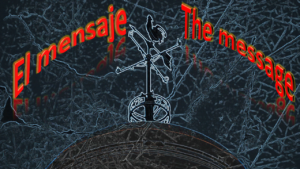DISEQUILIBRIUMS. The Individuals. Chapter 12
CHAPTER 12
Friday 16 December 2016
Time: 3:30 pm

“Who’s answering the phone?”
I am already at home. The first thing I hear is my mother calling out from her room. The house telephone can be heard everywhere. I look in the living room. My brother isn’t there. The door to his room is ajar, but the light is off. I see that the door to the bathroom is closed. I go directly to the telephone. When the telephone has been ringing for a while, it is truly annoying. When I finish the call, I will change the ring tone. This reminds me of the unpleasant sound they used at my school to mark the end of break when I was little. How irritating! After such a good time on the patio to go back into class! I’ve always wondered why they don’t have classes on the patio instead of the classrooms.
“I’ll answer it, mum.” I shout as I reach the phone.
Seeing what’s next to the telephone as I pick up the telephone receiver, I shout:
“Your mobile’s also here, if you are looking for it!”
“Thank you.” I hear my mother call out from the back.
I turn my attention to the telephone receiver to find out who’s calling. For a second, my heart skips a beat when I hear a female voice at the other end, saying:
“Is your mobile turned off? I’ve been trying to call you for some time.”
Although not the same female voice that brightened my whole afternoon earlier, I’m very happy to hear Elsa’s voice.
“I’m not sure,” I answer, as I look at my phone. “Now I see what’s happened. I must have put it on silent mode at some point and have not activated it again. How are you, Elsa?”
“I’m OK. I’m OK,” she begins in an agitated voice. I’ve never heard her like this before. She always appears to be the epitome of the strong woman you see in the films, who’s always keeping her emotions in check. Today, she’s not, nor is she now. I begin to feel worried too. She then continues: “I have to tell you what’s happened to me.”
Her voice appears more relaxed. I become attentive. She manages to grab my attention:
“When I got home last night, the five of us sat down to dinner. I was distracted during dinner as I was thinking about what had happened to us up to this precise moment, going over everything step by step. I was a little worried…”
She stops for a moment as if taking a run-up to continue to release all that she wants to say to me in less than a minute.
“.. Then I realised that the rest of my family were all very nice. My brothers only talked about the basketball match they had played that afternoon and my father could not stop telling us all how well his boys had played. I don’t exactly know why, but I was surprised because lately, dinners tended to end up in arguments between my two older brothers. As I am the youngest, they always throw the blame on me and I end up going to bed angry with them.”
For a moment, I can imagine the scene. I know she is the youngest. Not only is she the youngest, she is also the smallest in size. And as everything in life depends on your perspective, if we who are her companions think that she is big, her brothers are positively enormous. They have taken after their parents, both of whom are over 6 feet tall. What makes me laugh is the thought of that family of five having dinner in such a small kitchen as theirs is. Elsa always says that they wanted to move into another apartment because of the size of the kitchen. But they have never done so. The scene at least is amusing.
“During that moment of peace,” Elsa continues, “I told them about all that had happened to us during the day and the story about the teacher and, in particular, what had happened at the museum.”
She is quiet for a moment. Then, the tone of her voice changes as if she is angry:
“My brothers are such idiots!” She is upset and she knows it. She lowers her voice: “They laughed at me and would not let me continue talking! Can you believe it? But what was worse was that my father said: ‘That’s rubbish. You have to focus on studying what’s really important, and all that story about the Romans and the city of Zaragoza is worthless. I’ve never learnt anything about that and look how well I’ve turned out. I’ve never needed all that nonsense’.”
She falls quiet again. I ask her to continue because I don’t know if she’s going to cry or shout:
“It’s my dad, for crying out loud, and I know that I’m important to him. If he knew how bad his words were going to make me feel, I am sure that he wouldn’t have said it.”
She stops for a moment and continues more calmly:
“I looked at him very sternly, I looked away and continued eating in silence. He will never know how close he came to getting all the wine in his glass spilt all over him ‘accidentally’ by me as I bumped against the table ‘by accident’. But, you know David, they don’t understand us. So once again, I let it pass.”
Fortunately, no crying or shouting. But I am intrigued. From the little I know of Elsa, I know she would never call me just to tell me that.
“Has anything else happened, Elsa?”
“Yes, yes, that’s why I called you,” she continues. “Just as my father finished talking his rubbish, both my mother and father put their hands up in pain to cover their right ear at the same time. I remembered what had happened to the History teacher.”
She remains quiet for a moment and sighs deeply.
“At that precise moment, they each received a text message on their mobiles. As it all felt so strange, although we keep our mobiles away from the table when we are eating, they both got up and picked up theirs.”
At the other end, Elsa falls silent for a moment, but I can’t contain myself:
“And what happened? Did they faint?” I ask.
“No, no. The earache didn’t last long and I watched to see if they were bleeding. But they were not. They checked their messages and they read it at the same time having realised that their message was the same. It was only one sentence with the words joined up: “’Zaragozacollapses’.
I am quiet but intrigued. I see that my mother’s mobile has an intermittent light flashing, indicating that there’s a new text message.
“On reflex, I looked at my own mobile and saw that there were no messages,” Elsa continues, rousing me from my distraction. Then, she asks, “Could you tell me if you’ve received a message?”
Writer: Glen Lapson © 2016
English translator: Rose Cartledge
Publisher: Fundacion ECUUP
Project: Disequilibriums
Register on the website www.disequilibriums.com/en/registred and you will receive a notification to allow you to read the chapters as they are published and updates of the project.

No Comments